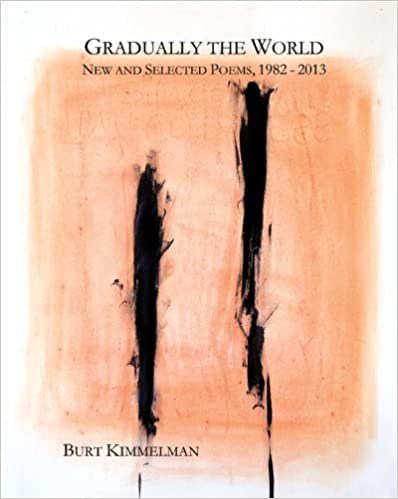At mid-century when teevee--a ten-inch Emerson--entered our lives, prize fighting was still a major sport and the Friday Night Fights (formally the Gillette Cavalcade of Sports) exhibited forms of the heroic closer to Pindar's models than those presently extolled on ESPN. Among the middleweights, Ray Robinson personified the classic virtues--grace, power, speed--but he was haunted by the battered face of Carmen Basilio: none of the above but the bastard wouldn't quit, despite moving up from welterweight to taste the Sugar. Skip Fox used to do a dandy Sugar Ray, but his later work more closely resembles Basilio's style, relentlessly stalking instances of coherence. It matters not the punch he takes, fielding hooks, jabs, uppercuts, the occasional bolo straight on, jaw out, eyes registering the quality of the light exploding in his brain. He's still shuffling, cutting down the ring; and when he gets it trapped in the corner, no room for tap dancing, he works the body implacably. The show is worth tuning in if you like to watch Nemesis at work.
—Brian Richards
Skip Fox is a scatter-shot Wittgenstein with an Ornette Coleman soul. He "lays on" better than Macduff inviting readers to dive (and surface with bloodshot eyes!), to excavate, or more properly, –to DIG!
— Jesse Glass
Spleen is a bulwark against pessismism , says Walter Benjamin in an essay on Baudelaire. Baudelaire was no pessimist. Neither is Fox. For To is catastrophe set in stone, the rock from which the language springs. Yet, as Benjamin goes further to suggest, [t]he devaluation of the world of things in allegory (Fox's prime land) is surpassed within the world of things itself by the commodity . One's expression is invariably taken over by a fetishist economy of signs, forcing mortality of the object into the picture. The gap between symbol and symbolized widens, and this is the girth of Fox's effort. Not to close it, but to see in its opening the futility, grace and perfectible wound that intimacy inflicts, the briefest of flowering lives, the orchid, the nectarine, and the like. E. M. Cioran, like Fox, a Cynic (and equally no pessimist) has it that [e]ternity is rot, and God a carrion which the human worm feeds on . Ed Dorn has noted that sensibility is no substitute for consciousness. And that's the point, certainly in our time: that the maggot be allowed to clear the skeleton. Cleanliness is next to Godliness, but purity alone is no match for freshness of invention. Inconsistency is itself what makes beauty so offensive. Every gesture we dare make is by definition deviant. As Giacomo Leopardi wrote, [t]here is nothing more rare in the world than someone who is usually bearable . In that sense, For To is the commonest of currencies.
— Stephen Ellis
Skip Fox has the integrity, the mastery of format, associated with the old pirate radio stations. His form is *broad-cast* : startling new music and jingles, give-aways and contests, news and commentary--all juggled by a DJ armed somehow with throwing knives. He's always giving static to the cornball and the romancer, with a mix of techniques that ranges from footnotes to bumperstickers. His asterisks are his ninja stars: a lethal delivery system. But it's not radio or combat, it's writing. When I read Skip Fox, I'm always a little afraid of what I'll see. He has the dangerous quality of the artist: the more of himself he gives, the more authentic the reader imagines himself to be. Be careful and make sure you're hearing him right. He may seem to be anchored out in the North Sea (off the Louisiana coast, beyond territorial waters) but it's not as if the rest of us were safe ashore.
—Stephen Petroff
I've read Skip Fox closely for a decade. He continues to amaze me, every book grows from the previous as if by magic. There is no one writing better in the language.
—Tom Bridwell
In Skip Fox's verse, there are no perimeters, rather a constant reaching beyond to another outside of which he is inside. What's to say that hasn't been lived or thought that isn't willing to? Nothing is ever final. Skip's never above or below anyone or thing but instead inhabits the spaces between, communal places where seminal happenings all have their chance to unfold. His curiosity, rooted always thru experience, transmits a timeless tone, as in wait, where have we been taken, and if here before, something's different, changed.
—Micah Ballard
Book Information:
· Paperback: 273 pages
· Binding: Perfect-Bound
· Publisher: BlazeVOX [books]
· ISBN: 1-934289-72-8





